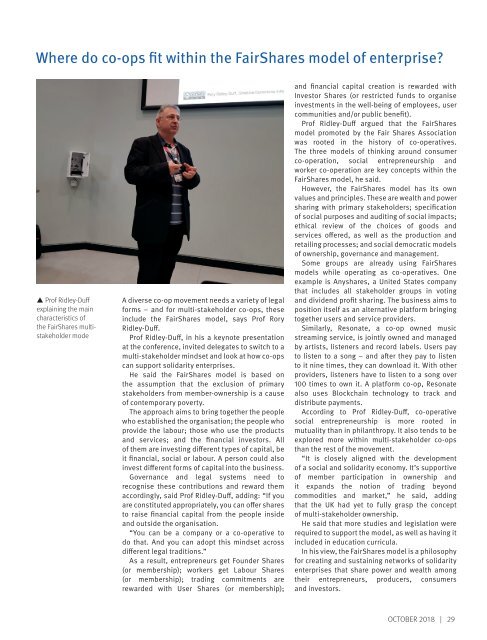OCTOBER 2018
The October 2018 edition of Co-op News is all about politics: Can cop-operatives steer a course through troubled times? Plus... breaking the association with Communism in eastern Europe / co-ops and the civil rights movement in the USA / the UKSCS conference / MEET... Co-op Party stalwart, Lord Graham of Edmonton
The October 2018 edition of Co-op News is all about politics: Can cop-operatives steer a course through troubled times? Plus... breaking the association with Communism in eastern Europe / co-ops and the civil rights movement in the USA / the UKSCS conference / MEET... Co-op Party stalwart, Lord Graham of Edmonton
You also want an ePaper? Increase the reach of your titles
YUMPU automatically turns print PDFs into web optimized ePapers that Google loves.
Where do co-ops fit within the FairShares model of enterprise?<br />
p Prof Ridley-Duff<br />
explaining the main<br />
characteristics of<br />
the FairShares multistakeholder<br />
mode<br />
A diverse co-op movement needs a variety of legal<br />
forms – and for multi-stakeholder co-ops, these<br />
include the FairShares model, says Prof Rory<br />
Ridley-Duff.<br />
Prof Ridley-Duff, in his a keynote presentation<br />
at the conference, invited delegates to switch to a<br />
multi-stakeholder mindset and look at how co-ops<br />
can support solidarity enterprises.<br />
He said the FairShares model is based on<br />
the assumption that the exclusion of primary<br />
stakeholders from member-ownership is a cause<br />
of contemporary poverty.<br />
The approach aims to bring together the people<br />
who established the organisation; the people who<br />
provide the labour; those who use the products<br />
and services; and the financial investors. All<br />
of them are investing different types of capital, be<br />
it financial, social or labour. A person could also<br />
invest different forms of capital into the business.<br />
Governance and legal systems need to<br />
recognise these contributions and reward them<br />
accordingly, said Prof Ridley-Duff, adding: “If you<br />
are constituted appropriately, you can offer shares<br />
to raise financial capital from the people inside<br />
and outside the organisation.<br />
“You can be a company or a co-operative to<br />
do that. And you can adopt this mindset across<br />
different legal traditions.”<br />
As a result, entrepreneurs get Founder Shares<br />
(or membership); workers get Labour Shares<br />
(or membership); trading commitments are<br />
rewarded with User Shares (or membership);<br />
and financial capital creation is rewarded with<br />
Investor Shares (or restricted funds to organise<br />
investments in the well-being of employees, user<br />
communities and/or public benefit).<br />
Prof Ridley-Duff argued that the FairShares<br />
model promoted by the Fair Shares Association<br />
was rooted in the history of co-operatives.<br />
The three models of thinking around consumer<br />
co-operation, social entrepreneurship and<br />
worker co-operation are key concepts within the<br />
FairShares model, he said.<br />
However, the FairShares model has its own<br />
values and principles. These are wealth and power<br />
sharing with primary stakeholders; specification<br />
of social purposes and auditing of social impacts;<br />
ethical review of the choices of goods and<br />
services offered, as well as the production and<br />
retailing processes; and social democratic models<br />
of ownership, governance and management.<br />
Some groups are already using FairShares<br />
models while operating as co-operatives. One<br />
example is Anyshares, a United States company<br />
that includes all stakeholder groups in voting<br />
and dividend profit sharing. The business aims to<br />
position itself as an alternative platform bringing<br />
together users and service providers.<br />
Similarly, Resonate, a co-op owned music<br />
streaming service, is jointly owned and managed<br />
by artists, listeners and record labels. Users pay<br />
to listen to a song – and after they pay to listen<br />
to it nine times, they can download it. With other<br />
providers, listeners have to listen to a song over<br />
100 times to own it. A platform co-op, Resonate<br />
also uses Blockchain technology to track and<br />
distribute payments.<br />
According to Prof Ridley-Duff, co-operative<br />
social entrepreneurship is more rooted in<br />
mutuality than in philanthropy. It also tends to be<br />
explored more within multi-stakeholder co-ops<br />
than the rest of the movement.<br />
“It is closely aligned with the development<br />
of a social and solidarity economy. It’s supportive<br />
of member participation in ownership and<br />
it expands the notion of trading beyond<br />
commodities and market,” he said, adding<br />
that the UK had yet to fully grasp the concept<br />
of multi-stakeholder ownership.<br />
He said that more studies and legislation were<br />
required to support the model, as well as having it<br />
included in education curricula.<br />
In his view, the FairShares model is a philosophy<br />
for creating and sustaining networks of solidarity<br />
enterprises that share power and wealth among<br />
their entrepreneurs, producers, consumers<br />
and investors.<br />
<strong>OCTOBER</strong> <strong>2018</strong> | 29


















